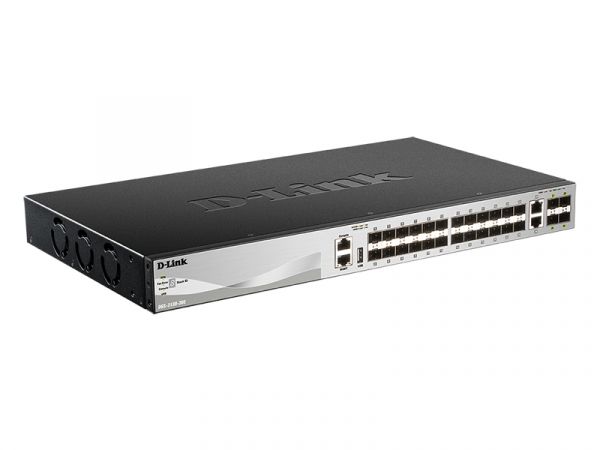
DGS-3130-30SEOL
Description
The DGS-3130 Series switches are Lite Layer 3 Stackable* Managed Switches designed to connect end-users in a secure enterprise or metro Ethernet access network. These switches support multicast, and enhanced security, making them an ideal Gigabit access layer solution. The DGS-3130-30PS provides 24 10/100/1000Base-T PoE ports, 2 10GBase-T ports and 4 10G SFP+ port. Each 10/100/1000Base-T port on the DGS-3130-30PS supports the 802.3af and 802.3at PoE standards. The default power budget is 370 watts and can be expanded to 740 watts with the DPS-700 RPS*. The switches are also equipped with an USB 2.0 port, allowing the user to boot images and upload configuration files directly from, as well as conveniently save syslog files onto a USB 2.0 storage device.
Enhanced Network Reliability
The DGS-3130 Series targets enterprises and metro Ethernet applications, and customers who require a high level of network security and maximum uptime. All the models in the DGS-3130 Series support an external redundant power supply** to ensure continued operation. They also include reliability features, such as 802.1D Spanning Tree (STP), 802.1w Rapid Spanning Tree (RSTP), and 802.1s Multiple Spanning Tree (MSTP), Loopback Detection (LBD), and Broadcast Storm Control, that enhances network resilience. G.8032 Ethernet Ring Protection Switching (ERPS) minimizes the recovery time to 50 ms. For load sharing and redundancy backup in a switch cascading/server attachment configuration, the DGS-3130 Series provides dynamic 802.3ad Link Aggregation Port Trunking.
Comprehensive Security
The DGS-3130 Series provides users with the latest security features such as Multi-layer and Packet Content Access Control Lists (ACL), Storm Control, and IP-MAC-Port Binding (IMPB) with DHCP Snooping. The IP-MAC-Port Binding feature allows administrators to bind a source IP address with an associated MAC and also define the port number to enhance user access control. With the DHCP Snooping feature, the switch automatically learns IP/MAC pairs by snooping DHCP packets and saving them to the IMPB white list.
Easy Access Control Policies
The DGS-3130 Series supports authentication mechanisms such as 802.1X, Web-based Access Control (WAC), and MAC-based Access Control (MAC) for strict access control and easy deployment. After authentication, individual policies such as VLAN membership, QoS policies, and ACL rules can be assigned to each host. In addition, the switch also supports MicrosoftВ® NAP (Network Access
Protection). NAP is a policy enforcement technology that allows customers to protect network assets from compromised computers by enforcing compliance with network health policies.
Versatile Traffic Management
The DGS-3130 Series implements a rich set of multilayer QoS/CoS features to ensure that critical network services such as VoIP, video conferencing, IPTV, and IP surveillance are given high priority. Traffic Shaping features guarantee bandwidth for these services when the network is busy. L2 Multicast support enables the DGS-3130 Series to handle growing IPTV applications. Host-based IGMP/MLD Snooping allows multiple multicast subscribers per physical interface and ISM VLAN to send multicast streams in a multicast VLAN to save bandwidth and to provide better security to the backbone network. The ISM VLAN profiles allow users to bind/replace the pre-defined multicast registration information to subscriber ports quickly and easily.
Proactive, Effective Network Management
To uphold enterprise customers™ Service Level Agreements (SLA), service providers must reduce their Mean Time to Repair (MTTR) and increase service availability.
* Physical stacking will be available in future firmware versions.
** RPS is not included in the package contents.
General features
Certificates
Order info
DGS-3130-30S 24 1000Base-X SFP ports, 2 10GBase-T ports and 4 10G SFP+ port L3 Stackable* Managed Switch
* Physical stacking will be available in future firmware versions.


